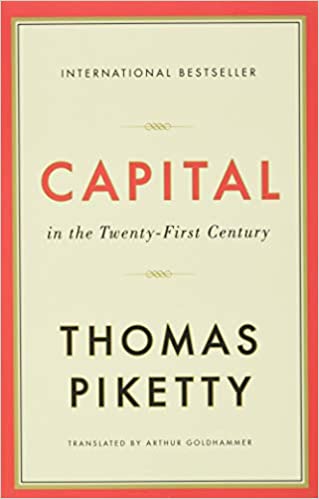Thomas Piketty – Capital in the Twenty-First Century Audiobook
Thomas Piketty – Capital in the Twenty- Very First Century Audiobook

Capital in the Twenty- Very First Century Audiobook
Thomas Piketty’s book, “Capital in the Twenty First Century,” has really been resoundingly backed by Nobel Reward winning economic expert Paul Krugman. Since the traditionalists were going bananas, I could not withstand evaluating it and likewise discovering for myself what the hoopla was whatever about. The element for the reactionary go bananas is gone over listed below.
Any person who has actually troubled to read this book need to admit that the author is substantial in his analyses and my understanding was the author avoids prejudgment. Piketty supplies extensive information throughout in a remarkable historical examination of resources and likewise the inescapable obstacles of indecent inequality of wealth (” … the ‘very first globalization of funding in addition to occupation (1870- 1914) stays in a number of techniques equivalent to the ‘second globalization’ which has actually been in progress thinking about that the 1970’s.” and likewise, “… commercialism immediately produces approximate and unsustainable inequalities that considerably threaten the meritocratic worths on which democratic cultures are based.”) There were elements for the monetary shocks and likewise the world wars of the 20th century, in addition to if we’re not taking note …
Piketty keeps in mind that, “Economists are all frequently busied with small mathematical issues of interest simply to themselves.” However, the important financial solutions and likewise pattern analyses are entirely resolved in addition to rapidly reasonable by all. Capital in the Twenty- Very First Century Audiobook Free. He keeps in mind that company economics should be considered a branch of social science, i.e., “… nationwide politics is common and likewise … financial and likewise political adjustments are completely linked in addition to requirement to be investigates together.”
If definitely nothing else, the reader is encouraged, “… all people should take a considerable interest in money, its measurement, the realities surrounding it, and its history. Those who have a great deal of it [cash] never ever quit working to secure their enthusiasms. Declining to handle numbers hardly ever serves the enthusiasms of the least wealthy.”
So why are traditionalists flipping out over this book? Piketty concludes that public financial obligation can just be decreased by: repudiation (bad), inflation (dreadful), austerity (really terrible), or a vibrant tax on financing (affordable). Much better, he recommends that the just reasonable method to handle indecent vast array inequality is a vibrant international tax commitment on wealth, which subsequently requires worldwide openness of accounts and likewise an end to worldwide tax commitment sanctuaries; he goes on to state none of these actions will be basic, yet does provide practical concepts. Plainly, the plutocrats would worry over popularization of such a pointer, and it just takes a word or 2 from them to turn up their Unique- interest groups in addition to puppet companies (I will not call names) right into thoughtlessly trashing these logical ideas. For That Reason the one- star evaluates from those that have not check outthe book In his intro to this book, Piketty states, “When the rate of return on capital surpasses the rate of development of outcome in addition to incomes, as it performed in the 19th century and likewise appears rather probably to do once again in the twenty- initially, industrialism immediately produces approximate and likewise unsustainable inequalities that drastically weaken the meritocratic worths on which democratic cultures are based.” He even more points out that “Intellectual in addition to political dispute concerning the circulation of riches has actually long been based upon a wealth of bias and likewise a scarceness of truth.” He then resolves this scarceness with the discussion in addition to analysis of the results the task he resulted in get a huge amount of historical details concerning international profits in addition to vast array.
In the introduction, he rapidly evaluates the payments yet furthermore the errors of earlier disagreement without information. These included Malthus’s interest in overpopulation and likewise the requirement to end up all well- being, Ricardo’s concept of shortage with people in addition to production broadening as land becomes significantly limited, and Marx’s idea of unlimited build-up with the commercial modification causing no limitation on the build-up of financing (which did rule out coming social democracy, technological advancement, and simply how to arrange society without individual financing). Thomas Piketty – Capital in the Twenty- Very FirstCentury Audio Book Online The Kuznets Shape of 1955 provided information from United States tax return in addition to Kuznets’s own price quotes of across the country incomes in conclusion that inequality raised in the really early stage nevertheless decreased in the later stages of industrialization. Unfortunately, this shape significantly downplayed the functions of the World Wars and intense monetary and likewise political shocks that resulted in the decline in inequality in between 1914 and 1945 and stopped working to talk about the increasing inequality after 1970.
Piketty looks for to contribute “to the dispute worrying the finest approach to arrange society … to achieve a just social order … achieved appropriately under standard of policy … based on democratic argument.” He discusses he has “no interest in knocking inequality or commercialism per se … as long as they are necessitated.” He worked briefly in the United States in addition to discovered the work individuals economic experts implausible. “There had really been no substantial effort to collect historical details on the characteristics of inequality given that Kuznets, yet the profession continued to produce simply scholastic results without likewise comprehending (the) realities.”